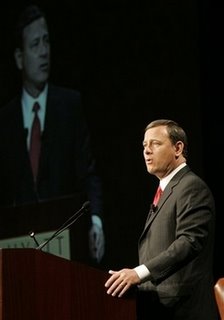When he's not drinking or letting women drown to death, Senator Ted Kennedy is writing
opinion pieces for the
Washington Post. The title of the piece says it all, "Roberts and Alito Misled Us." That's a fairly provocative statement. Not as provocative as Roberts and Alito Lied, but a charge like that would be severe enough to warrant impeachment. Kennedy's not that brave or stupid to call for it.
Kennedy claims that Roberts and Alito misled the Judiciary Committee in their hearings...
The result has been the confirmation of two justices, John G. Roberts Jr. and Samuel A. Alito Jr., whose voting record on the court reflects not the neutral, modest judicial philosophy they promised the Judiciary Committee, but an activist's embrace of the administration's political and ideological agenda.
I want everyone (that means people on the Right, Left, and all points in between) to stop using the term "activist" when talking about judges. It's stupid. It's gotten to the point where the term has lost its true meaning. Now, it just means "a decision that I think is wrong."
Kennedy rails on Roberts and Alito for being tools of the administration and outside of the mainstream. Of course, these two Justices don't vote only with each other. They aren't on the losing end of 7-2 decisions. Other Justices agree with them. Most often, those Justices are Scalia and Thomas. Fairly frequently, Justice Kennedy is in there too. I guess that means that an entire wing of the Court and legal thought in general is activist.
Kennedy attacks Roberts for a few cases in particular, including this...
In League of United Latin American Citizens v. Perry , the Supreme Court held that Texas's 2003 redistricting plan violated the Voting Rights Act by protecting a Republican legislator against a growing Latino population. Roberts reached a different view, concluding that the courts should not have been involved and that it "is a sordid business, this divvying us up by race."
Kennedy has no problem with the Court divvying us up by race. Personally, I'd rather have equal treatment.
Kennedy gets into a bit of a snag with the Justices' votes here...
In Rapanos v. United States , the court was asked to interpret the definition of wetlands under the Clean Water Act. Four justices deferred to the Army Corps of Engineers' expertise in implementing the statute. But Roberts and Alito joined an opinion that describes wetlands as "transitory puddles" and criticizes their colleagues for "giving that agency more deference than reason permits." For Roberts and Alito, protecting the environment -- unlike "protecting public morality" -- is clearly not a top priority.
I love how he says that four Justices took the Corps' view, and then that Roberts and Alito were out in la la land somewhere. What about the other Justices?
Rapanos was a 5-4 decision, with a four vote plurality (Roberts, Scalia, Thomas, Alito) that was joined in result by Kennedy. That means that five Justices agreed with the outcome and four explicitly agreed with the opinion. They must all be tools of the administration, huh? That's the only way this could happen. They couldn't, you know, all adhere to a widely accepted view of statutory interpretation that would cause them to reach this result. No way.
I would also like to make it clear that it's not the Court's priority to protect the environment. It's the job of Congress to enact legislation. They can clear up most of the
Rapanos mess by giving more detailed guidelines to the Corps. That would be too much work for them, though. Kennedy might have to do something other than act pompous, like, you know, work.
Kennedy then says that the confirmation process needs reform. He has a few points that I would like to comment on...
First, any qualified nominee to the Supreme Court will have spent many years thinking about legal issues. We should require that nominees share that thinking with the Judiciary Committee, and not pretend that such candor is tantamount to prejudging specific cases.
Bull. If it was fine and dandy for Justice Ginsburg to give "no hints, no forecasts, no previews," then it should be fine for everyone else. If a nominee has a judicial record, it is pretty easy to tell what their general philosophy is on the Constitution. Ask them about their past cases. More importantly, ask them about their decision making process and analysis of the cases. That's where the really interesting stuff lies. Unfortunately, most of the Senators don't care about that. They just want to ask "Why did you side with Big Business?" for the umpteenth million time.
Kennedy wants to hear more about the views of nominees that he wants torpedoed. Make them say they will overturn
Roe and they're done. That's the idea. He can preface this all he wants with "...the next justice will be nominated by a Democratic president and be sent to a Democratic Senate for confirmation." He really just wants to force an answer that he can use to sink a nomination if that wet dream of his doesn't come true.
Here is point number two...
Second, the Judiciary Committee will need to reorganize the way it asks questions. An in-depth inquiry will require something more than short rounds of questions that pass from senator to senator.
Bull. The day-long hearings may need some changing, but the Senators have more than enough time to ask questions. Everyone needs to remember Senator Biden's brilliant performance where he took 30 minutes to ask about four questions. If the Senators themselves cut down on the speech-giving and reigned in their egos, they could ask quite a bit. They could also do some more preparation, so they could ask intelligent follow-up questions. I know those pre-written questions from law professors cut down on the work the Senators have to do, but it doesn't make for a very penetrating examination.
If time really is that big of an issue, the Senators of each party can do a better job of coordinating their questioning. I have no proof of this, but I think that the Senators already coordinate their questioning. They all have some issues of personal importance they ask about at length (abortion, voting rights, etc.) and then an issue or two that they all want to use to kill the nomination. The Democrats decided to ask question after question to Alito about Vanguard, trying to trip him up. It failed. They decided to waste their time, asking the same questions over and over and over again. It's their fault that all of that time was wasted.
The third point that Kennedy makes deals with the reason for the hearings...
But it is essential that we learn enough of their legal views to be certain that they will make good on the simple promise etched in marble outside the Supreme Court: "Equal Justice Under Law."
I find it funny that he would use that quote. He certainly doesn't believe in it. He thinks that the Justices should stand up for the environment or "the little guy" or minorities or whatever. To Hell with the text of the law or the Constitution. If you don't vote in favor of these interests, you're getting kicked off the Kennedy Christmas card list. That's not the way the law should work. If the law says that the little guy should win in this situation, then he should win. If the law says that the big guy should win in this situation, then he should win. Kennedy doesn't want that. He wants his side to win regardless. Maybe someday, Kennedy will get the Court that he wants: one that has an activist's embrace of Kennedy's political and ideological agenda (see what I did there?).
For more on this wonderful opinion piece, check out
Jonathan Adler at Volokh,
Andrew at Confirm Them, and
Matthew Franck at Bench Memos. They have some great, in depth analysis. Kennedy's misquoting of Justice Thomas in
Hamdan in order to slam Alito is especially nice.



